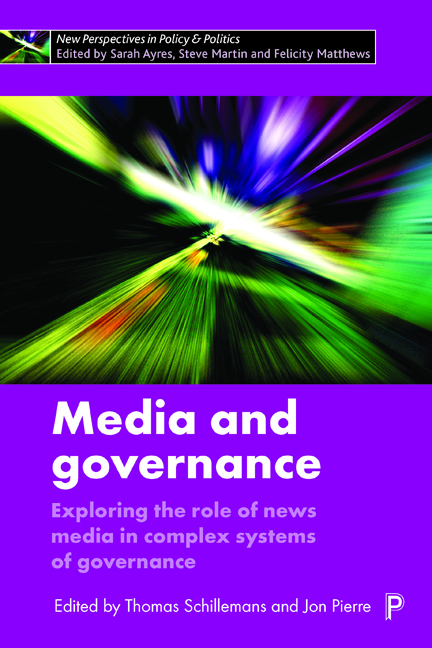Book contents
- Frontmatter
- Contents
- List of figures and tables
- Notes on contributors
- Introduction: Entangling and disentangling governance and the media
- one Governance and the media: exploring the linkages
- two Media and public accountability: typology and research agenda
- three Political control or legitimacy deficit? Bureaucracies’ symbolic responses to bottom-up public pressure
- four Mediatised local government: social media activity and media strategies among local government officials 1989–2010
- five Fighting or fumbling with the beast? The mediatisation of public sector agencies in Australia and the Netherlands
- six The mediatisation of university governance: a theoretical and empirical exploration of some side effects
- seven Managing commercialised media attention in complex governance networks: positive and negative effects on network performance
- eight Over-responsibilised and over-blamed: elected actors in media reporting on network governance. A comparative analysis in eight European metropolitan areas
- Index
eight - Over-responsibilised and over-blamed: elected actors in media reporting on network governance. A comparative analysis in eight European metropolitan areas
Published online by Cambridge University Press: 19 April 2022
- Frontmatter
- Contents
- List of figures and tables
- Notes on contributors
- Introduction: Entangling and disentangling governance and the media
- one Governance and the media: exploring the linkages
- two Media and public accountability: typology and research agenda
- three Political control or legitimacy deficit? Bureaucracies’ symbolic responses to bottom-up public pressure
- four Mediatised local government: social media activity and media strategies among local government officials 1989–2010
- five Fighting or fumbling with the beast? The mediatisation of public sector agencies in Australia and the Netherlands
- six The mediatisation of university governance: a theoretical and empirical exploration of some side effects
- seven Managing commercialised media attention in complex governance networks: positive and negative effects on network performance
- eight Over-responsibilised and over-blamed: elected actors in media reporting on network governance. A comparative analysis in eight European metropolitan areas
- Index
Summary
Introduction
Since the mid-1990s, scholars in the field of public administration have increasingly focused on processes of public-policy making in which the traditional state authorities do not play the central role. Such ‘governing without government’, as Rhodes (1996, 65) has called it, is based on self-organising, inter-organisational networks as a mode of coordination distinct from state and market. Later on, the term of network governance was coined to define ‘public policy-making and implementation through a web of relationships between government, business and civil society actors’ (Klijn, 2008, 511). Empirically, governance networks have been studied in a wide range of fields (see Pierre, 2000), ranging from local and urban policy, over public sector reform, to international relations. Research on governance networks has also focused on a broad array of theoretical topics. At the outset, it was mainly concerned with the novelty of governance networks, exploring their formation, their distinctive characteristics compared to states and markets, as well as their potential contribution to policy effectiveness and efficiency. More recently however, a ‘second generation of governance network research’ (Torfing, 2005, 311) has enlarged the agenda to include more general and overarching questions. This notably entails a growing interest in normative issues, that is, the ‘democratic problems and potential of governance networks’ (Sørensen, 2005) related to the tensions that exist between governance networks and the ‘workings of the traditional institutions of representational democracy’ (Klijn, 2008, 520). In this respect the democratic quality of governance networks is often criticised as problematic with respect to democratic accountability (Papadopoulos, 2003). They involve corporate, private or civil society actors who make a substantial contribution to policy-making, but cannot be held accountable by citizens via mechanisms of electoral control. The upshot of empirical research on this question, however, is that there is no general rule. Indeed, the democratic accountability of governance networks is seen to depend on their ‘anchorage’ in representative institutions and democratic practice (Sørensen and Torfing, 2005).
This chapter aims to contribute to this debate on the democratic accountability of governance networks. In doing so, we will shed light on a dimension that has been overlooked in this debate so far: the public sphere. Indeed, analyses of the democratic implications of governance networks have been characterised by a somewhat narrow institutional perspective, neglecting the processes of political communication that are crucial, in mass democracies, for the accountability of policy actors to the public.
- Type
- Chapter
- Information
- Media and GovernanceExploring the Role of News Media in Complex Systems of Governance, pp. 169 - 192Publisher: Bristol University PressPrint publication year: 2019



